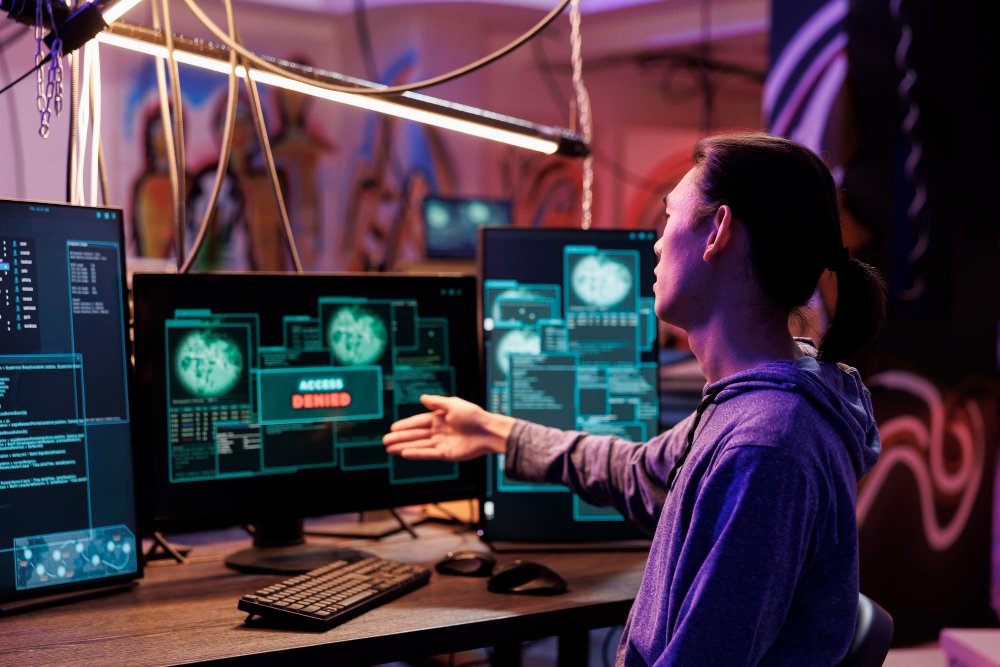The Growing Demand for Cybersecurity Talent: How AI and Automation are Shaping the Workforce
In today’s digital age, the importance of cybersecurity cannot be overstated. With increased cyber threats, data breaches, and hacking attempts, businesses and organizations worldwide are under constant pressure to protect their digital infrastructures. As a result, the demand for cybersecurity professionals has skyrocketed. However, as the industry expands, it is also undergoing a significant transformation driven by the rise of AI and automation technologies.
This article will explore how AI and automation are reshaping the cybersecurity workforce, what skills are now in demand, and how these technological advancements create new career opportunities while challenging traditional cybersecurity roles.
The Rising Demand for Cybersecurity Professionals
As cyber threats become more sophisticated and pervasive, organizations of all sizes are investing heavily in cybersecurity measures. Whether protecting sensitive customer data, securing financial transactions, or safeguarding intellectual property, businesses need robust defenses against a constantly evolving array of digital threats. This growing need has led to a surge in demand for skilled cybersecurity professionals.
Cybersecurity has become a critical component of modern business, creating a significant gap between the number of available workers and the number of job openings. As cyberattacks grow in scale and complexity, the cybersecurity workforce has struggled to keep pace. This demand is expected to continue rising as more organizations adopt digital transformation initiatives and increasingly rely on cloud computing, the Internet of Things (IoT), and artificial intelligence to run their operations.
However, while there is a clear demand for cybersecurity workers, the field is evolving. Introducing AI and automation into cybersecurity transforms the industry’s most valuable roles and skills.
The Role of AI in Cybersecurity
Artificial intelligence has been making waves in various industries, and cybersecurity is no exception. AI systems are now being integrated into cybersecurity operations to enhance the detection and prevention of cyber threats. By leveraging machine learning algorithms, AI can analyze vast amounts of data, identify patterns, and detect anomalies that may indicate a security breach. This allows organizations to respond to threats more quickly and effectively.
AI is particularly valuable in threat detection. Traditional cybersecurity methods rely on manual analysis, where experts sift through logs and data to identify potential threats. However, this process can be time-consuming and prone to human error. With AI-powered tools, cybersecurity teams can automate much of this work, allowing them to identify and respond to threats in real-time. Machine learning algorithms can be trained to recognize unusual behaviors, such as attempts to access sensitive information or modify system configurations, and alert security teams before significant damage occurs.
Furthermore, AI can help organizations predict future attacks by analyzing historical data and identifying trends in cybercriminal behavior. This predictive capability gives cybersecurity professionals a proactive edge, allowing them to develop strategies to mitigate risks before they occur. As a result, organizations are increasingly seeking cybersecurity professionals who understand how to implement and manage AI-driven security tools, creating new opportunities for skilled workers.
Automation and Its Impact on Cybersecurity Roles
Automation is another significant force reshaping the cybersecurity workforce. Many routine and repetitive tasks traditionally performed by human cybersecurity analysts are now automated, freeing workers to focus on more strategic and complex issues. Automated tools can handle tasks such as log analysis, patch management, and vulnerability scanning, which reduces the burden on cybersecurity teams and increases overall efficiency.
However, the rise of automation also brings new challenges. As more tasks are automated, the role of the cybersecurity professional is shifting. Instead of spending time on manual tasks, cybersecurity workers are now required to oversee, manage, and optimize automated systems. This shift requires new skills, including working with AI and automation tools, analyzing their outputs, and making strategic decisions based on automated reports.
Moreover, automation is not a replacement for human expertise; instead, it is a tool that enhances the capabilities of cybersecurity professionals. While AI and automation can identify potential threats and automate routine tasks, human judgment is still essential for making critical decisions about responding to complex and sophisticated attacks. This combination of human expertise and automated tools leads to the creation of hybrid roles, where cybersecurity professionals must have technical and analytical skills to thrive in the evolving industry.
Skills in Demand for the AI-Driven Cybersecurity Industry
As AI and automation become more integrated into cybersecurity, the skills required for cybersecurity professionals are evolving. Traditional skills, such as knowledge of firewalls, encryption, and network security, are still necessary, but new technical skills are becoming increasingly valuable. These include proficiency in AI and machine learning, an understanding of automation technologies, and the ability to work with large datasets.
One of the most essential skills in demand is the ability to analyze and interpret the data generated by AI systems. As AI-driven security tools become more common, cybersecurity professionals must be able to assess the accuracy of AI outputs, identify false positives, and make informed decisions based on automated recommendations. This requires not only technical expertise but also strong analytical and problem-solving skills.
In addition, cybersecurity workers must be adaptable and open to learning new technologies. The cybersecurity landscape is constantly changing, and professionals must stay up-to-date with the latest developments in AI and automation to remain competitive in the job market. As the industry continues to expand, opportunities for continuous learning and skill development will be critical for those looking to build a successful career in cybersecurity.
The Future of Cybersecurity Jobs
The expanding role of AI and automation in cybersecurity is both a challenge and an opportunity for workers in the field. While these technologies transform traditional roles, they create new and exciting career paths. Cybersecurity professionals who embrace these changes and develop the skills needed to work with AI-driven systems will find themselves well-positioned in an industry that increasingly adopts AI-powered cybersecurity tools; the demand for professionals who can implement, manage, and optimize these technologies will only increase. This shift is opening up new possibilities for job seekers, offering opportunities to work at the cutting edge of cybersecurity technology.
Growing Demand for Growing Talent
The demand for cybersecurity talent is growing at an unprecedented rate, driven by the increasing complexity of cyber threats and the rise of AI and automation technologies. While these advancements reshape the workforce, they also create new opportunities for skilled professionals. AI and automation are enhancing the capabilities of cybersecurity teams, allowing them to detect threats more efficiently and focus on higher-level strategic tasks.
For those willing to adapt to the changes and acquire the necessary skills, the future of cybersecurity offers exciting possibilities. As AI and automation continue to shape the industry, cybersecurity professionals will be at the forefront of protecting the digital world, combining human expertise with cutting-edge technology to stay one step ahead of cybercriminals.

















